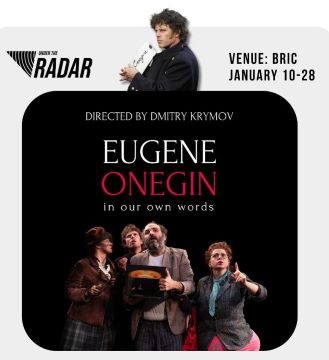The death of childhood is the beginning of poetry.
— Andrei Tarkovsky
“This is a children’s show,” informed the Krymov Lab NYC stage manager after showing us where we could hang up our coats, “so please pick a child and take it with you into the theater.” She gestured towards an alcove full of “children” with nametags. I chose Abigail. She was about two-and-a-half-feet tall, had green tinsel hair that she would fling back with a turn of her swiveling head fashioned out of a stuffed paper bag. She had enormous eyes made out of light sockets, a green dress, and burlap limbs, except for her right arm, which was a feather duster. Every “child” was different, and every audience member got one; the few that were left over were seated at the foot of the stage.
Anya Zicer (Inna) Elizabeth Stahlmann (Alla)
Trying to describe Dmitry Krymov’s absurdist and perfectly theatrical Pushkin “Eugene Onegin” in our own words, I am at a loss. Brilliant, delightful, intimate, hilarious, warm, whimsical and resonant are some adjectives that leap to mind. The experience feels like an effortless stream-of-consciousness poem, enchanting and exhilarating, combining whatever is on hand, often seemingly disparate elements — forks and spoons and eyelash curlers, a feather, wooden machines with spinning gears and pullies, puppetry, ballet, rubber goose feet, singing, narration, audience interaction, a small model of a theater, a smaller model of a theater, snow, video projections, a nesting doll, Kermit the Frog, a clown nose, a portrait of Pushkin, history, deconstructionism, and a toy gun (just to name some) — into an immersive, fluid spectacle built around “the greatest Russian poet” and Eugene Onegin, his most famous novel-in-verse.
Elizabeth Stahlmann (Alla) Jackson Scott (Oleg) Jeremy Radin (Pyotr) Anya Zicer (Inna)
While it’s difficult to pinpoint precisely when Pushkin begins (with the “children”?), let’s say the performance proper commences with four members of a provincial Russian-immigrant acting troupe — pushy, impertinent, lumpy and worn — staggering onto the stage with their bags of odd junk. They start by giving a dryly humorous lesson on the different parts of theater, or a theater: this is the proscenium; this is the stage; this is what’s above it; this is what’s below it, and so on. Suddenly, a man from the audience runs up to the Russians, shouting condemnations at them for the war in Ukraine and pelting the lead performer in the face with rotten tomatoes. Then, the irate man sits back down, and the lesson continues.
Elizabeth Stahlmann (Alla), Natalie Battistone (Stage Manager), Jeremy Radin (Pyotr), Anya Zicer (Inna)
We learn about the Russian “spleen,” about Russian poets and winter and the snow and Pushkin and the fact that his poetry is impossible to translate and why (I’m not certain I agree with the why, but that’s beside the point). I suspect all poetry, but certainly Russian poetry, is impossible to translate. However, it is possible to reinvent it. Or, perhaps more apropos of the offering in question, to build on it, to build something else from it. Indeed, Mr. Krymov and his wonderful performers create an inspired show that is at once expansive — spanning continents and cultures, languages, centuries, realities — and at the same time, dear and delicate and small, like a child.
The excellent cast is comprised of Natalie Battistone, Kwesiu Jones, Jeremy Radin, Jackson Scott, Elizabeth Stahlmann, and Anya Zicer.
Jeremy Radin (Pyotr) Anya Zicer (Inna)
photos by Bronwen Sharp
Pushkin “Eugene Onegin” in our own words
Krymov Lab NYC
presented with Under the Radar (Mark Russell, Festival Director)
& ArKtype (Festival Producer)
BRIC, 57 Rockwell Pl in Brooklyn
90 minutes, no intermission
Tues-Sat at 7:30; Sun at 3
ends on January 28, 2024
for tickets (starting at $52), visit Universe
Anya Zicer (Inna) Elizabeth Stahlmann (Alla) Jeremy Radin (Pyotr) Jackson Scott (Oleg)

